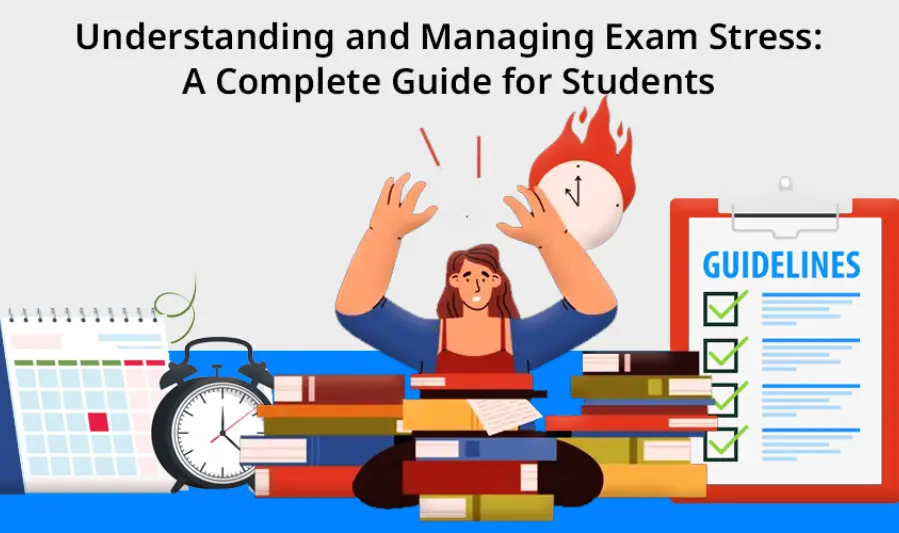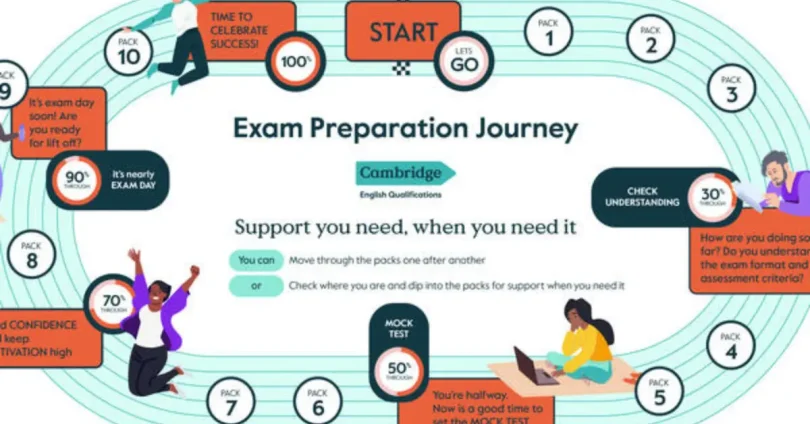Introduction
Exams can be a major source of stress for students at any level—but with the right approach, they don’t have to be overwhelming. Effective exam preparation goes beyond just last-minute cramming; it involves planning, strategy, and consistent effort.
Many students struggle with where to start, how to manage time, or what techniques actually work. As a result, even hours of studying may not lead to the performance they expect.
This blog is designed to help. Whether you’re preparing for finals, entrance exams, or professional certifications, we’ll walk you through a step-by-step process for mastering your studies. From setting goals to managing stress, this guide will equip you with the tools you need for confident and effective exam preparation.
Understand the Exam Requirements

Before diving into your study materials, it’s crucial to fully understand what the exam will test and how it will be structured. This foundational step ensures you’re studying with purpose and focus.
Check the Syllabus and Exam Format
- Carefully review the official syllabus or course outline
- Identify key topics, weightage, and any excluded content
- Understand the format of the exam:
- How many sections?
- Is it multiple choice, essay-based, or practical?
Understand Question Types
Different exams test different skills. Knowing the types of questions helps tailor your study approach:
- Multiple Choice Questions (MCQs): Focus on detail, definitions, and concepts
- Essays: Practice organizing ideas and writing under time pressure
- Problem-Solving: Emphasize understanding formulas, methods, and applying concepts
Review Past Papers or Sample Exams
- Analyze previous years’ questions to identify patterns
- Practice under exam-like conditions to improve speed and accuracy
- Use sample papers to self-assess and spot weak areas
By understanding exactly what’s expected, you can avoid wasting time on irrelevant material and focus on what truly matters.
Set Clear Study Goals

Once you understand the exam structure and content, the next step is to set clear, focused goals. Without defined goals, studying can feel overwhelming or aimless. Setting goals helps you stay organized, motivated, and on track.
Define What You Need to Achieve for Each Subject
- List the topics, chapters, or units you need to cover
- Identify your strengths and weaknesses in each subject
- Allocate more time to subjects or topics that need improvement
Use SMART Goals
Make your study goals SMART:
- Specific: Focus on a particular topic or task (e.g., “Revise Chapter 4: Photosynthesis”)
- Measurable: Track your progress (e.g., “Complete 20 practice questions”)
- Achievable: Be realistic about your time and ability
- Relevant: Align goals with the exam syllabus
- Time-bound: Set deadlines (e.g., “Finish by Thursday evening”)
Example:
“Complete two past papers for math by Sunday and review all incorrect answers.”
Break Down Big Goals into Daily or Weekly Targets
- Turn large goals into manageable chunks
- Create a weekly plan with specific tasks each day
- Celebrate small wins to stay motivated
Setting clear, SMART goals not only improves your focus but also makes it easier to measure your progress and adjust your strategy if needed.
Create a Study Schedule
A well-structured study schedule is essential for staying consistent and covering all topics in time. It helps reduce stress, avoid last-minute cramming, and keep you accountable throughout your exam preparation journey.
Allocate Time Based on Subject Difficulty and Importance
- Prioritize challenging subjects or topics you’re less confident in
- Allocate more time to subjects with higher exam weightage
- Distribute your time across subjects to maintain balanced preparation
Example:
If math is your weakest subject, you might schedule 1.5 hours for it daily and 1 hour for stronger subjects like English.
Include Time for Revision and Breaks
- Set aside time for weekly review sessions
- Plan short breaks (5–10 mins) every hour to avoid burnout
- Schedule longer breaks (30–60 mins) between study blocks to recharge
Use Digital Tools or Planners
Make your schedule easy to follow and adjust with the help of planning tools:
- Google Calendar – Set time blocks and reminders
- Notion or Trello – Organize study tasks visually
- Study apps like MyStudyLife, TickTick, or Todoist – Track goals and deadlines
A smart schedule keeps your progress on track, ensures enough time for practice and revision, and helps maintain a healthy study-life balance.
Organize Your Study Materials
Efficient study begins with having everything you need in one place. When your materials are organized, you save time, reduce distractions, and stay more focused during each study session.
Collect All Study Resources in One Place
- Gather your class notes, textbooks, reference materials, assignments, and past papers
- Make a checklist of what you need for each subject so nothing gets overlooked
- Download or print syllabus outlines to stay aligned with exam requirements
Organize Both Digital and Physical Materials
- Digital:
- Create subject-specific folders on your laptop or cloud storage (e.g., Google Drive, OneDrive)
- Use clear filenames (e.g., “History_IndustrialRevolution_Notes.pdf”)
- Bookmark useful online resources or use apps like Notion to centralize your study content
- Physical:
- Use binders, notebooks, or folders for different subjects
- Separate handouts, notes, and exercises using labeled dividers
- Store essentials (pens, highlighters, sticky notes) within reach
Keep Your Study Space Clutter-Free
- A clean, organized environment supports better concentration
- Remove distractions like unrelated books, devices, or clutter
- Personalize your study area with motivating quotes or a simple calendar
Staying organized not only makes your study process smoother but also helps you feel in control, which boosts confidence before exams.
You may also like to read these posts:
Best Gaming PCs Under $1000 in 2025 for Smooth
Best Business Computers in 2025: Performance & Reliability
Powerful & Compact: Best Portable Mini PCs for Work
Exam Preparation Made Easy: Proven Steps to Study Smart
Use Active Learning Techniques
Passive reading alone isn’t enough for effective exam preparation. To truly understand and retain information, you need to actively engage with the material. Active learning techniques help deepen comprehension, boost memory, and make studying more efficient.
Highlighting and Summarizing
- Highlight key points and terms as you read, but avoid over-highlighting
- Write brief summaries of each chapter or topic in your own words
- Helps reinforce understanding and identify areas that need more review
Self-Testing with Flashcards or Quizzes
- Use flashcards (physical or apps like Anki or Quizlet) to quiz yourself
- Practice retrieving information without looking at notes
- Take practice quizzes or past papers under timed conditions
Teach Concepts to Others
- Try the Feynman Technique: explain a topic as if teaching it to a beginner
- Teaching forces you to clarify your thoughts and fill in gaps in understanding
- Use study groups or even teach to an imaginary audience
Mind Maps and Diagrams for Visual Learning
- Use mind maps to connect related concepts
- Create diagrams, charts, or timelines for visualizing processes or historical events
- Ideal for visual learners and complex subjects with many interrelated parts
Active learning doesn’t just make studying more effective—it also keeps it engaging and less monotonous, improving your ability to recall information during the exam.
Practice Past Papers and Mock Tests
Practicing past exam papers and mock tests is a powerful strategy to prepare effectively for your exams. It helps you get comfortable with the exam format, sharpen your time management skills, and pinpoint areas where you need further study.
- Simulate Exam Conditions:
Attempt past papers in a quiet environment, without distractions, and strictly follow the exam time limits. This practice helps build familiarity and confidence, reducing surprises on exam day. - Improve Time Management:
Timed practice allows you to gauge how long each section takes, ensuring you can complete the exam within the allotted time. It teaches you to pace yourself and allocate time wisely during the actual test. - Identify Weak Areas and Focus Your Revisions:
Review your answers critically to spot topics where you struggle. Use these insights to tailor your revision, dedicating extra time to concepts that need improvement.
By regularly practicing under realistic conditions, you can approach your exams with greater confidence and efficiency.
Review and Revise Regularly
Consistent review and revision are key to transferring information from short-term to long-term memory. Incorporating effective revision techniques can significantly enhance your exam performance.
- Use Spaced Repetition and Active Recall:
Revisit topics at increasing intervals rather than cramming all at once. Combine this with active recall—testing yourself without looking at notes—to strengthen memory retention. - Revise Topics Weekly or Bi-Weekly:
Schedule regular revision sessions for each subject to keep information fresh. This prevents forgetting and makes studying less overwhelming closer to exam time. - Maintain Summary Sheets or Revision Flashcards:
Create concise summary notes or flashcards for quick review. These tools make it easy to reinforce key concepts and formulas on the go.
By reviewing and revising systematically, you build a strong foundation that supports better understanding and recall during exams.
Take Care of Your Health
Your physical and mental well-being play a crucial role in how effectively you study and perform in exams. Prioritizing healthy habits can boost your focus, energy, and overall productivity.
- Get 7–9 Hours of Sleep:
Quality sleep is essential for memory consolidation and cognitive function. Avoid all-night study sessions and maintain a consistent sleep schedule. - Eat Nutritious Meals and Stay Hydrated:
Fuel your brain with balanced meals rich in fruits, vegetables, protein, and whole grains. Drinking enough water helps keep you alert and improves concentration. - Practice Light Physical Activity and Relaxation Techniques:
Incorporate short walks, stretching, or yoga to reduce stress and increase blood flow to the brain. Try deep breathing or meditation to stay calm and focused during study breaks.
Taking care of your health ensures your mind and body are prepared to tackle exam challenges effectively.
Faqs:
What is the best time to start preparing for exams?
Ideally, you should start preparing at least 4–6 weeks before the exam. Early preparation allows enough time for understanding, revision, and practice without stress.
How many hours should I study each day?
It depends on your schedule and subject load. On average, 3–5 focused hours per day is effective. Quality matters more than quantity—ensure you’re actively engaging with the material.
How can I stay focused while studying?
Create a distraction-free environment, set specific goals, and use time management techniques like the Pomodoro method. Taking regular breaks also helps maintain concentration.
What should I do if I feel overwhelmed before the exam?
Take deep breaths, review only key points, and avoid cramming. Practicing mindfulness, doing light exercise, and ensuring proper rest can help reduce anxiety.
Are group studies effective for exam preparation?
Yes, when done right. Group studies can help with concept clarification and motivation. However, stay focused on the topic and keep the group small and serious.
Conclusion:
Effective exam preparation is less about studying harder and more about studying smarter. By following a structured approach—starting early, setting clear goals, using active learning techniques, and taking care of your well-being—you can reduce stress and improve performance. Remember, consistency is key. Stick to your plan, stay positive, and believe in your preparation. With the right mindset and methods, success is well within your reach.





